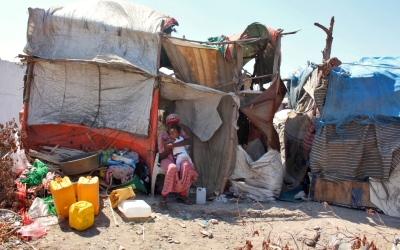Fleeing poverty, Yemenis gamble life on deadly border route to Saudi Arabia

Being a father of three children in Yemen, Hilal* has for years had to navigate impossible options to provide for his family, with the continuing civil war leaving the country and its economy in tatters.
Hilal, 44, had worked in Saudi Arabia since 2006, visiting his family in Yemen just once every two years, up until 2022, when he could no longer afford the monthly residency fees, work permit and sponsor fees, which have increased in recent years.
He decided to return to his home in Taiz, in Yemen's southwest.
"I was an unemployed man for around a year in Yemen, and I could not find any job. I fell into debt, and owed money to several people. I had no choice but to go back to Saudi Arabia," he told Middle East Eye.
To return legally would have cost a considerable sum to get a visa and pay the required fees. Instead, he decided to enter the kingdom illegally and live under the radar as an undocumented foreign worker to avoid paying authorities.
Stay informed with MEE's newsletters
Sign up to get the latest alerts, insights and analysis, starting with Turkey Unpacked
Expats in Saudi Arabia are required to pay a monthly work permit fee of 800 riyals ($211). They also have to pay a monthly dependent fee of 400 riyals per dependent. The amount they have to pay to their sponsors varies.
Last month, Hilal and some of his friends made a deal with a smuggler from Saadah province to pay him 3,000 riyals when they arrive in Riyadh.
"We were 15 people in a car for 10, and the smuggler drove us through the desert. When we arrived near the Saudi border, I heard shooting, and he started driving even faster. The Saudi border guards were chasing us, shouting for the driver to stop, but he didn't," Hilal said.
"Two of the passengers were shot dead and three others were wounded. Then the driver stopped. I wasn't aware where we were, but the Saudi forces were shouting at us, especially at the driver. They took us to a jail where there were dozens of others."
'I saw death'
Hilal remained in jail for two weeks as Saudi forces investigated him and his friends.
Authorities accused them of working with the Yemeni Houthi rebels and smuggling qat, a mild narcotic drug, but Hilal was able to convince them that he was only trying to enter Saudi Arabia to look for a job to help him pay his debts and provide for his family.
Hilal was deported and returned to his home in Taiz, but this time he returned alone, and without the friends who had been killed at the border. He now has more debts than before.
"How can a man like me find a job in this world? What can I do? The only choice was Saudi Arabia, and it seems to be inaccessible now. I'm frustrated, and I have nothing to do. I pray God to help me.
"I can't forget the moments when Saudi forces shot our friends in the car, and I saw death in front of me. Right then I lost hope that I would stay safe. These moments are enough to convince me not to try again and enter Saudi Arabia illegally."
This is not the first time that Yemenis have heard about people being killed on the border with Saudi Arabia, but many Yemeni youths have no choice but to risk their lives and go with smugglers to the kingdom.
No other choice
Khalil*, 39, has been entering Saudi Arabia illegally for seven years. He has been deported three times but keeps returning because, he says, he knows how to cautiously deal with Saudi forces.
"I enter Saudi Arabia with smugglers who are familiar with the road and with dealing with the Saudi forces at the borders, so such a journey is usually safe," he said.
"As soon as the Saudi forces shout for the driver to stop, he immediately stops. Then we explain to them that we have families to provide for and we are only looking for work to help us stay alive. They usually allow us to continue or deport us peacefully."
He said that hundreds of Yemenis attempt to enter Saudi Arabia every day, and he blames the smugglers for the deaths of many of them, since, according to Khalil, border guards shoot only the people who try to escape.
"No one is happy to go on this difficult journey," he said. "But there are no jobs in Yemen, and the only choice for me is to work in Saudi Arabia."
Sami is another desperate to risk the journey to find work.
"I'm 37 years old, and I'm still a man without a job. I cannot marry or rent a home, so I'm planning to enter Saudi Arabia illegally," he told MEE.
"Sometimes I think about joining the battles, but I think entering Saudi Arabia is less dangerous than fighting, so I'll do it."
Like Sami, many consider the option of joining in the war but figure trying to get into Saudi Arabia the safer option. Nor are Yemenis alone in making the dangerous trip and paying the price with their lives.
'Sometimes I think about joining the battles, but I think entering Saudi Arabia is less dangerous than fighting'
- Sami
Ethiopian workers are being systematically targeted, and some killed, on a daily basis as they try to cross the kingdom from Yemen, according to a report published last month by the Mixed Migration Centre (MMC).
"There is physical violence, torture, arbitrary detention - all speak of being shot at, with people dying around them at the northern border between Saudi Arabia and Yemen," Bram Frouws, the director of MMC, told MEE last month.
The United Nations has previously highlighted the issue, condemning "gross human rights violations against migrants".
A communication by several special rapporteurs published in 2022 said that up to 430 people, including refugees and asylium seekers, were killed and 650 wounded between January and April 2022, some by cross-border fire, in Saddah province and the Saudi border province of Jizan at the hands of Saudi security forces using artillery shelling and small arms.
*Names have been changed to protect the identity of the people interviewed in this piece.
Middle East Eye delivers independent and unrivalled coverage and analysis of the Middle East, North Africa and beyond. To learn more about republishing this content and the associated fees, please fill out this form. More about MEE can be found here.





